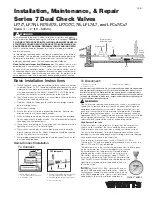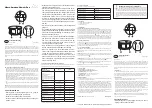
47
Electrical Connections and Commissioning
Test Procedures for Tuchenhagen PMO Valve Type M-C/2.O
Test Procedures for
Tuchenhagen PMO Valve Type M-C/2.O
Purpose
•
The purpose of test procedure 1 is for the Regulatory Inspector to check and ensure
that the detecting devices which detect and confirm the closed position of the upper
and lower seats of the PMO valve respectively (as per PMO Item 15p.(B) - Point
1.b.(2)) are adjusted and functioning properly.
•
The purpose of test procedure 2 is to allow the Regulatory Inspector to confirm the
proper control system interlocking of the PMO Valve type M/2.O during an active
circuit CIP operation.
Test Procedure Overview
The methodology behind the test procedure 1 is for the Regulatory inspector to manually
implement the upper seat lift and the lower seat lift operations locally at the valve,
thereby verifying that the position detecting devices used for upper and lower seat
closed position detection DO change status.
Hardware Description
1. The T.VIS A-15 or T.VIS M-15 Control Top on the top of the valve will house 3 sole-
noid valves
a)
Solenoid Y1 – Main Valve Activation
b)
Solenoid Y2 – Lower Seat Lift Activation
c)
Solenoid Y3 – Upper Seat Lift Activation
These valves can be activated externally by sending signals from the PLC.
2. The lower seat closed position is detected by path measurement system. The correct
adjustment of this system to detect the closed position of the lower seat is given in detail
on page 33 of the Operating instructions.
The sensitivity of the path measurement system is 0.1 mm.
3. The upper seat closed position is detected by the externally-mounted lantern prox-
imity switch S3 as shown on page 35 of the Operating instructions. The correct adjust-
ment of this switch to detect the closed position of the upper seat is given in detail on
page 35 of the Operating instructions.
The sensitivity of this proximity switch is also 0.1 mm.
















































